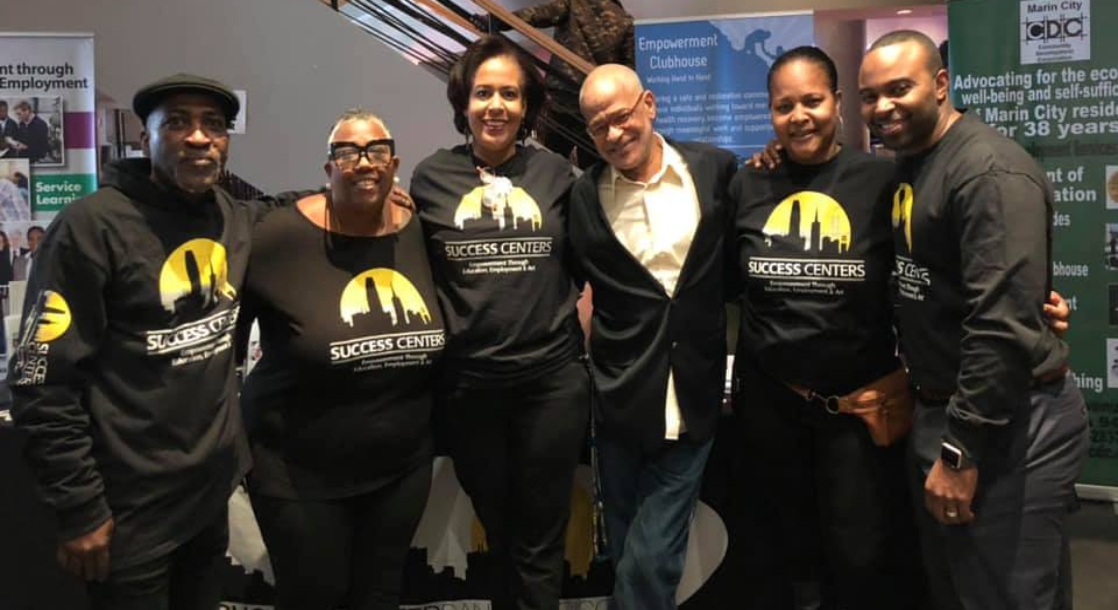The women behind Success Centers in San Francisco are taking it upon themselves to ensure that the cannabis space (and beyond) is an equitable industry for people of color.
Everyone loves the idea of making the cannabis industry a more equitable place. But there seems to be a disconnect when it comes to putting equity in motion. Some believe this has to do with the United States never being equitable in the first place — literally since its inception as a country. If the foundation on which you build a system is corrupt or racist, those ideals are intrinsically a part of its structure.
Thankfully, we’re living in a time when the cracks in the system are being unveiled. Yes, it’s chaotic and scary. But the confines under which our country was built are experiencing intense scrutiny, and ultimately (hopefully) carving out space for social change. The crew at Success Centers, a non-profit dedicated to social equity in San Francisco, are at the crest of this wave.
In fact, Success Centers has been leading the crusade for the past 36 years. The non-profit was founded in 1983 by Superior Court judges in order to provide alternative education, workforce development, and employment opportunities to people returning from detention facilities in San Francisco. Now, the program serves over 1,300 disconnected youth and marginalized community members annually — over 95 percent of which are low-income and 87 percent are people of color.
In the last five years alone, Success Centers has grown 600 percent. In the last 18 months, they’ve assisted 800 people land quality jobs in the cannabis industry and beyond. They’ve done this by providing intensive job training seminars, workshops, expungement clinics, and partnering with established Bay Area businesses such as Oaksterdam University. They help their mentees devise tight business plans and strategies in order to get them on a professional path that could lead to success.
“Doing this work is core to our DNA,” said Liz Jackson-Simpson, the CEO at Success Centers. “We do training in health, hospitality, construction, tech, cannabis, and the arts. It all happens because we are in partnership with these industries and have a vision of pushing up that mountain in the name of social equity and justice.”
In all of these industries, people of color are excluded, ignored, or pushed out, Jackson-Simpson explained. Success Center’s mission, then, is to figure out how to truly create equity in these spaces by finding employment opportunities for people of color and marginalized community members that aren’t entry-level, grunt work jobs.
San Francisco job fair (courtesy of Success Centers)
“People laughed at us when we added cannabis to our program,” Jackson-Simpson said. “But that was one of the industries our youth continuously talked about being a part of in the next five years — and now look where we are. They talked about entrepreneurship, and the fact this is the industry that they’ve been persecuted for, and so they want to have their share in it.”
Jackson-Simpson and Angela White, the “Equity for Industry” program manager at Success Centers, have been working incessantly to figure out how to make that happen.
“Angela, our Queen of Cannabis, has created opportunities and programs to not only help our locality develop a process but a standardization of this industry,” said Jackson-Simpson. “We want to help equity applicants become the entrepreneurs they want to be and build the real wealth they’ve been denied in the past.”
MERRY JANE caught up with White and Jackson-Simpson to talk about Success Centers, social equity in the cannabis space, and what employers need to be aware of when trying to make their businesses equitable.
Angela White
MERRY JANE: What advice would you give to an already established company that doesn’t know how to incorporate equity into their existing business model, but really wants to?
Angela White: The first thing I would say is to take a look around. When you walk into your office, what does your equity footprint look like? Who’s sitting around the table making all the decisions? If everyone is white, all male, and there’s not a bit of color — there’s a problem.
Liz Jackson-Simpson: I want to emphasize decision-makers, here. We’re not talking about having women or people of color in entry-level positions doing grunt work. We’re talking about having balance throughout the whole company, even at the top.
Is it as simple as just hiring women or people of color into those positions?
Angela White: There are struggles. I think it’s because people don’t consciously look at their business situations that way. People get comfortable with the circles they have. The cannabis industry, specifically, has always been kind of cliquish in a sense. You hang with your clique, you work with your clique, they bring in their buddies that they know. No one really in this industry is actually working with what they got their college degree in — they’re in the space because they know someone.
Also, make sure your recruiter knows that when they see a name on a resume like “Utopia Hammen” or “Tamera Willson” that it’s typically not going to be a Caucasian female. You want a recruiter who is actually going to look at those resumes and say, “how can we utilize this person, bring them in, and give them this opportunity?”
The best thing you can do is to keep an open mind and extend a hand when you get an opportunity to hire a person of color. Just because a person is African-American or Hispanic doesn’t mean they can’t do the job. Give them the opportunity. You might be surprised to find that you hired a super gem just by giving them an opportunity. That’s the kind of stuff I have been speaking to employers about.
What is the benefit of having women and people of color in the workplace — especially one that’s white-male dominated?
Liz Jackson-Simpson: You get a different perspective of the work and different ideas are thrown into the mix. What’s interesting is that any time new technology products are released, they’re tested out in urban centers first where there are typically women and people of color. If it does well in these areas, tech companies generally know it’s going to sell. So, basically we are representing the market of consumers that they know. So why not have those folks — who are typically on the R&D side — on your team helping you develop these products, or any products, ahead of time? Having people of color or women on your team gives you an edge that others might not have.
Liz Jackson-Simpson (Courtesy of Success Centers)
Who are the types of people you work with?
Angela White: We work with a rainbow of people. Folks from all walks of life and all different ages. We even work with people who are older, because, you know, if you look at the demographic from 1971 you got your seasoned War on Drugs vets, if you know what I mean. I don’t want people to forget about that equity community — and I want to call it “equity community” ’cause they got sweat equity in this game.
We work with highly intelligent people. We also work with people who’ve gone to college, have degrees, but are driving Uber because they couldn’t get in their industry of choice. And let me make one thing clear about that: it’s not because they aren’t good enough. But those are the kinds of situations minority communities have to deal with.
Do you work with people who are getting out of jail?
Liz Jackson-Simpson: Yes, we do re-entry. We work with all kinds of people, including people who’ve done decades in prison, or who’ve been in and out of incarceration for years, or who’ve been sustaining themselves on the underground economy – i.e. doing drug sales. We work with former police officers and sheriffs, former DAs and law enforcement.
But, if I may, the cannabis industry is not really re-entry friendly. People with criminal pasts are still not accepted into a lot of workplaces, expungements can’t always happen for various reasons, including that it’s a complicated process and lawyer fees are expensive. So if you can’t get a job then you have to do what you can to make money, which often leads to committing other offenses and then getting caught, and then you’re in a cycle. It’s not good. It’s not good because almost everyone — especially in cannabis — has done “criminal” acts, but a lot of people just weren’t caught. So why judge those who were caught and keep them from opportunities that will better their lives?
Courtesy of Success Centers
So, how does Success Centers go about record expungement?
Liz Jackson-Simpson: With those individuals who do have a checkered past, they can come in and consult with attorneys and get advice on how to get their records cleared, which can be a very complex process. It deters a lot of people. But the issue is that some local counties don’t honor expungements. If you have a criminal past whatsoever you are prohibited from working in a dispensary. It’s an oxymoron: everyone who’s worked in cannabis for a long time was once a criminal.
Angela White: In some cities, you have to go to the police department to get fingerprinted in order to get your record cleared, and it’s like — you’re dealing with a demographic of people who are typically avoiding the police. So, this lack of sensitivity — is it actually equitable? Obviously not. There’s no consideration for the people and their past and traumas.
Liz Jackson-Simpson: But you’re touting equity? Come on.
Courtesy of Success Centers
Tell us about one of your success stories.
Angela White: We had a verified equity person who got a job in a dispensary. He loved his job, but then his housing fell through. So he had to relocate to Las Vegas. And in Vegas you have to go down to the police department and get your fingerprinting done in order to get a cannabis job. Our guy had actually lived in Vegas previously, like 15 years ago or something. So, when they fingerprinted him, they found an old traffic ticket on his record. He ended up getting arrested and had to go to jail to clear up that warrant.
His wife was like, “The police station is not the place for us!” [laughs]
But he got out, and they gave him his car keys and gave him the go-ahead to work in the industry which was great. There was a company he wanted to get hired by that was taking job applications and doing interviews. He got out just in time to go to the hiring event. But when he arrived there, the line was out the door and around the corner — hundreds of people were trying to get the job.
Because he had gone through Success Center’s program and attended our workshops, worked in the cannabis industry in California, went to Oaksterdam and had certificates to back him up, and had knowledge of the industry, out of all the people lined up that day, he was the one who got the job!
Our program sets people up for success if they’re willing to put in the work. And this instance was proof. Stories like this are why I do what I do, and why I take pride in my work.
For more information visit Sucess Centers online. You can also follow them on Instagram, Facebook, and Twitter.
Follow Mary Carreon on Instagram and Twitter










Leave A Comment